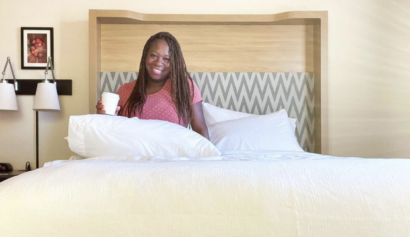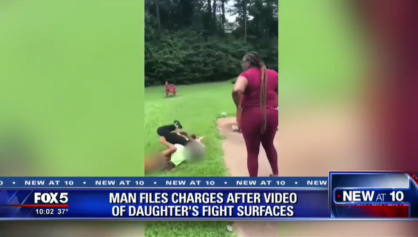At Atlanta Black Star, we are spending this entire week celebrating, honoring, exploring and uplifting Black Fatherhood by examining it through the lens of 7 themes: Lead, Build, Provide, Care, Protect, Work and Love. This is the fourth story in the series, by award-winning author Kuwana Haulsey, delving into beauty and power of black fathers nurturing and caring for their children.
My husband tells this story about how, when he was four years old, he decided that he was going to go out on the road with his father, the ventriloquist Willie Tyler. He very carefully removed his dad’s ventriloquist dummy, Lester, from its case and climbed inside. In his mind, his father would come in, pick up the case, and head straight to the airport, being none the wiser.
Clearly, this didn’t happen. After a frantic search, they finally found him, and his mother gave him more for his trouble than a trip to the airport. All my husband had wanted was to spend some time with his dad. But as a well-known performer and the head of a household that needed to be supported, Willie was usually on the road more than he was at home with his two sons.
Back in those days, being a man meant being the kind of provider who could sustain his family. It still does, to a large extent. But in the traditional model, the women did the caring and nurturing. The men? Not as much. At least, that wasn’t the primary expectation. You knew that your father loved you because he kept food on the table and a roof over your head. Anything extra—taking trips together, having long talks, displays of physical affection—was bonus material.
Fast forward to the present.
Today, black men have begun to proudly and decisively take on more active roles in their children’s day-to-day care. They are challenging the awful stereotype of the uninvolved father who either has no role in his children’s lives, or thinks that as long as he sends a check once a month, he’s fulfilled the extent of his commitment.
Our Father, Our Heroes:
It’s so beautiful to see black men wearing their babies in slings and carriers attached to their chests, holding small hands, and speaking softly, eye to eye, when they give correction to their little ones. They also nurture their children in less obvious, but equally important, ways.
I remember recently watching Henry Louis Gates interview Chris Rock about his ancestors for a PBS special. Somehow, Chris Rock got to talking about taking long drives with his grandfather, and then his father, as they drove around New York City. Both men worked grueling hours behind the wheels of taxis and trucks to support the family. Chris became visibly emotional as he recounted the lessons learned and the love shared in those hours together, whether any words were exchanged or not. These kinds of interactions are as necessary in the growth and development of children as it is when mother holds them close and kisses the boo-boo to make the pain go away.
Fathers shape our emotional landscape. The lessons they teach us about life, positive or negative, get lodged deep into our subconscious. They are instrumental in shaping our view of ourselves as worthy of love, devotion and nurturing. If it’s true that the mother’s face is a child’s first mirror, then the father is the foundation in which that mirror is set, holding it in place, steady and strong.
My father-in-law may not have had the opportunity to nurture his own sons with his physical presence as much as he might have liked. But my husband Cory took a path of expanded awareness in regard to fatherhood, completely changing that dynamic.
In the process, I believe his own father is learning a thing or two from him. Now, whenever I see Willie watering the grass in the backyard with his grandson, struggling to put a diaper on the right way, or falling asleep sitting up, with a long-limbed toddler flung across his body, I know that he’s more than made up for any lost time. The generations teach each other. In this way, we’re all made stronger and wiser.
Kuwana Haulsey is an award-winning novelist and author of the upcoming memoir, “Everything I Ever Needed to Know, I Learned from a Six-Month-Old.”

